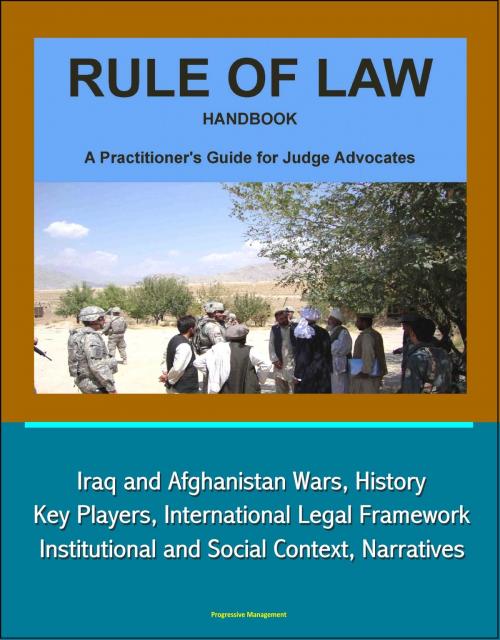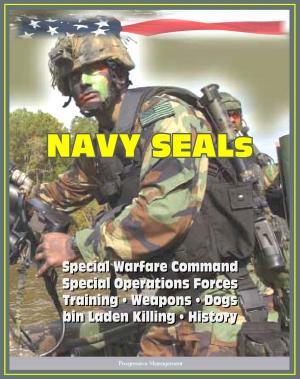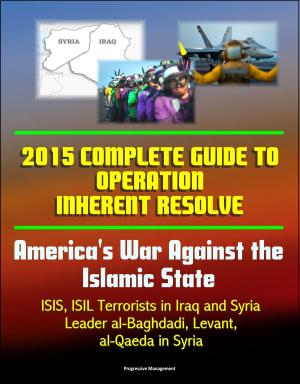Rule of Law Handbook: A Practitioner's Guide For Judge Advocates - Iraq and Afghanistan Wars, History, Key Players, International Legal Framework, Institutional and Social Context, Narratives
Nonfiction, Reference & Language, Law, Military, History, United States| Author: | Progressive Management | ISBN: | 9781311032997 |
| Publisher: | Progressive Management | Publication: | April 9, 2015 |
| Imprint: | Smashwords Edition | Language: | English |
| Author: | Progressive Management |
| ISBN: | 9781311032997 |
| Publisher: | Progressive Management |
| Publication: | April 9, 2015 |
| Imprint: | Smashwords Edition |
| Language: | English |
Professionally converted for accurate flowing-text e-book format reproduction, this important volume is the fourth edition of the Rule of Law Handbook published by the Center for Law and Military Operations (CLAMO) at The Judge Advocate General's Legal Center and School (TJAGLCS). Much has changed since the publication of the first volume in July of 2007. At that time, "surge" operations in Iraq had just begun and the eventual outcome of that tremendous commitment of resources was far from certain. The fight in Afghanistan, while no less important, drew relatively little in the way of public attention. In the three years since, violence in Iraq has dropped precipitously, allowing the Iraqi people to assert their rightful sovereignty in very real and dynamic ways. American forces have withdrawn from Iraqi cities, will end their combat mission in August of 2010, and completely exit Iraq by the end of 2011. Afghanistan is now at the forefront of public attention as it experiences its own surge of resources designed to move it down a similar path to success before U.S. combat forces possibly begin reducing their presence in July of 2011. Throughout these changes in circumstances, Judge Advocates and their joint, interagency, and multinational partners have quietly gone about advancing the rule of law (RoL) in these locations and others. However, as our military commitments in Iraq and Afghanistan wane or will soon wane, it is fair to ask if there is still a need for Judge Advocates to concern themselves with the rule of law mission. To answer anything other than "Yes!" would be shortsighted4 and unrealistic given our history and hope for the future.
Chapter 1 of the present handbook presents some of that history. It describes how Judge Advocates have been involved in rule of law efforts for over a century. It also makes clear how fertile the post-conflict ground is for cultivating the rule of law. When security is no longer the most pressing need, rule of law efforts can truly flourish. We are well past the conflict stage in Kosovo, yet Judge Advocates are still there participating in rule of law missions in welcome partnership with civilian practitioners. It is no doubt the sincere hope of all rule of law practitioners that the environments in Iraq and Afghanistan one day will similarly be so benign as to make ongoing rule of law efforts there "un-newsworthy." While rule of law efforts may become more or less newsworthy depending on the circumstances, they will always be important. One of the fourteen references to "rule of law" in the current National Security Strategy holds rule of law as one of the "essential sources of our strength and influence in the world." To maintain that strength and influence, rule of law will undoubtedly remain part of Judge Advocate practice into the future.
Professionally converted for accurate flowing-text e-book format reproduction, this important volume is the fourth edition of the Rule of Law Handbook published by the Center for Law and Military Operations (CLAMO) at The Judge Advocate General's Legal Center and School (TJAGLCS). Much has changed since the publication of the first volume in July of 2007. At that time, "surge" operations in Iraq had just begun and the eventual outcome of that tremendous commitment of resources was far from certain. The fight in Afghanistan, while no less important, drew relatively little in the way of public attention. In the three years since, violence in Iraq has dropped precipitously, allowing the Iraqi people to assert their rightful sovereignty in very real and dynamic ways. American forces have withdrawn from Iraqi cities, will end their combat mission in August of 2010, and completely exit Iraq by the end of 2011. Afghanistan is now at the forefront of public attention as it experiences its own surge of resources designed to move it down a similar path to success before U.S. combat forces possibly begin reducing their presence in July of 2011. Throughout these changes in circumstances, Judge Advocates and their joint, interagency, and multinational partners have quietly gone about advancing the rule of law (RoL) in these locations and others. However, as our military commitments in Iraq and Afghanistan wane or will soon wane, it is fair to ask if there is still a need for Judge Advocates to concern themselves with the rule of law mission. To answer anything other than "Yes!" would be shortsighted4 and unrealistic given our history and hope for the future.
Chapter 1 of the present handbook presents some of that history. It describes how Judge Advocates have been involved in rule of law efforts for over a century. It also makes clear how fertile the post-conflict ground is for cultivating the rule of law. When security is no longer the most pressing need, rule of law efforts can truly flourish. We are well past the conflict stage in Kosovo, yet Judge Advocates are still there participating in rule of law missions in welcome partnership with civilian practitioners. It is no doubt the sincere hope of all rule of law practitioners that the environments in Iraq and Afghanistan one day will similarly be so benign as to make ongoing rule of law efforts there "un-newsworthy." While rule of law efforts may become more or less newsworthy depending on the circumstances, they will always be important. One of the fourteen references to "rule of law" in the current National Security Strategy holds rule of law as one of the "essential sources of our strength and influence in the world." To maintain that strength and influence, rule of law will undoubtedly remain part of Judge Advocate practice into the future.















